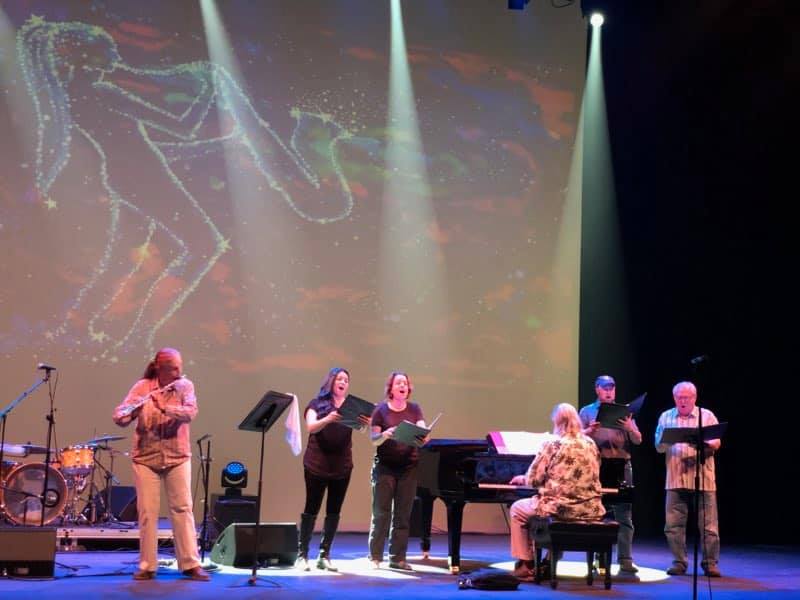Artist Profile: Esther Moses Bergh, Lyric Soprano
Esther Moses Bergh, Lyric Soprano
with Linda Marianiello, Executive Director, NMPAS
*Photo: Dress rehearsal with the 2019 New Mexico Music Commission Platinum Awards. Esther is to the left of artistic director Franz Vote, who is seated at the piano. Other NMPAS vocalists are Jennifer Perez, Tjett Gerdom, and Tim Willson, with flutist Linda Marianiello. Lensic Performing Arts Center, August 2019.
Esther sent her interview responses to me, and I think they are just perfect. That’s why I am posting them in her own words, particularly since she’s at home with her family during COVID-19, which made it hard for us to do a phone or Skype interview. Everyone at her home is doing homework online, meeting virtually, and Esther is teaching her students in the ABQ Public Schools remotely, too. 
– When did you start singing?
My start in singing was with my family in church and then performing a duet as nervous adolescents with my cellist friend, Carlos L. Encinias, now a broadway actor/teacher/director/choreographer. As we did our best to sing an English version of Schubert’s Heidenröslein, we realized in that moment we were addicted!
– When did you realize that you wanted to study voice?
While performing in high school productions and ensembles under Barbara Lioce, I started studying
with voice teacher, Sandra Neel. I had studied violin in elementary public school with Mrs. Mignot, and then enjoyed orchestra in middle and high school under Ms. Rafferty and Art Sheinberg, adding grandparent-funded private lessons with Kathie Jarrett. As a child, I took private piano lessons with a client of my dad’s, Barbara Carpenter, who worked on trade, and then later with Darlene Harris. Along with piano, my solo and orchestral experiences on violin definitely enhanced my ability to learn a vocal score and follow a director, once my attention turned to singing.
– What did you learn in college and what have you learned about the profession since graduation?
I studied with great teachers like Dr. Robert C. Smith, Leslie Umphrey, and Dr. Ellen McCullough-Brabson at the University of New Mexico, and also at the University of Cincinnati College-Conservatory of Music (CCM) with Barbara Honn and Sandra Bernhard. My undergrad was in Voice and also Music Education, so I learned a lot as a performer, as well as completing a teaching degree.
– Share a bit about your career to date.
After graduate school I worked mainly with the Portland Opera in their Education and Outreach tours, preview concerts and as a member of the Portland Opera Chorus for over a decade. When I moved back to New Mexico, I began working with the New Mexico Performing Arts Society as well as Music Theatre SW, Opera Southwest, and as a freelancer.
– What are your hopes for the future of your singing career?
I hope to continue singing as much as possible in concerts and operas, in addition to my work as a public school choral teacher. When I am not teaching and performing, I am enjoying my growing children and sunny afternoons tending bees with my dad, Dr. Moses, who continues to help many New Mexicans in his naturopathic business. As second generation New Mexicans, we enjoy a life of health – full of music, faith and family.
– Share a bit about some of the opera scenes you’ve participated in with NMPAS: Aida, Rosenkavalier Trio, etc. What about your experiences with the music of
J. S. Bach through the NM Bach Society?
At NMPAS, I have enjoyed singing Bach and Mozart, including as soloist in the Mozart Requiem and Bach oratorios and cantatas. I’ve also been privileged to debut new and modern works by Aaron Alter, Daniel Crafts, and the late John Donald Robb. In the NMPAS opera concerts, I had the opportunity to sing some weightier repertoire in scenes from Verdi’s Aida, Wagner’s Die Meistersinger and R. Strauss’ Der Rosenkavalier.
– Finally, if your work is currently on hold, how is this affecting your life? How can fans of our NMPAS artists help you through this health crisis?
Yes, I’ve been impacted by the pandemic and lost the opportunity to perform in four different performances as a result – some of which can’t be rescheduled. We all eagerly anticipate the day when we can gather to resume live performances.
